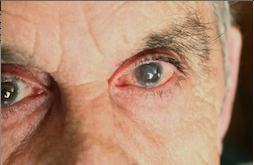Cataracts is perhaps the most common cause of blindness for people over the age of 40. In fact, statistics show that the people affected by cataracts are much more numerous than those who suffer from other common age-related eye illnesses like glaucoma, diabetic retinopathy, and macular degeneration.
 |
| Studies have shown that you can avoid cataract surgery by following a natural and nutritional approach to cataract treatment |
In cataracts, the natural lens of the eye gets clouded, making it more and more opaque until rays of light can no longer pass through, thus leading to complete blindness. Cataract treatment is often essential to prevent progression to blindness.
Cataract Symptoms
At first, you will notice some blurring of vision, like peering into a cloudy glass. You will also notice that lights are brighter and more glaring, but the colors have become less bright than usual. Most people neglect these symptoms and just shrug them off as nothing. Because of this, people with early signs and symptoms of cataracts do not consult their eye doctors until it is too late to treat without surgery. This can be a pity because there are several non-surgical cataract treatments that can stall its development.
Cataract Treatment
Once you start experiencing cataract symptoms, you should consult your ophthalmologist right away. If your cataracts are at an early stage of development, he/she may prescribe you some visual aids and/or a drug/supplement to slow the progression of the disease. But once the cataract can no longer be stalled or prevented, the only cataract treatment that can help you is surgery.
Cataract surgery has a high success rate, hence making it one of the most frequently performed surgeries in the United States. In this operation, the doctor removes the damaged lenses and replaces them with intraocular lenses, hence restoring better vision.
Problems With Cataract Surgery
Just like any other surgery, cataract surgery has its own set of drawbacks. For one, your eyes may still seem blurry immediately after the surgery. It may take a few weeks for your vision to start improving, since it depends on the healing time of your eye.
Also, if there are any underlying problems with regard to your vision loss, such as macular degeneration or glaucoma, cataract surgery will not be able to restore your vision. Your eye problems will not completely go away, so in order to address your other eye problems, you might still need to make use of eyeglasses. There are also risks involved with cataract surgery, such as bleeding and infection.
Cataract Prevention & Natural Cataract Treatment Without Surgery
The good news is there are a lot of natural cataract treatments that you can benefit from, especially during the early stages of cataracts. Studies have shown that proper nutrition can actually help prevent the development of cataracts and, in some cases, even reverse the disease process and help you achieve better eyesight.
Carotenoids
Two major causes of cataracts are free radicals and exposure of the lens to ultraviolet light.
Certain food groups contain high levels of antioxidants, which are known to improve eyesight by neutralizing free radicals. Some foods can also reduce the effect of ultraviolet light on your eyes.
A type of nutrient that achieves both of the above are carotenoids. Carotenoids are a plant-based pigment that cannot be produced by animals. Three particularly effective examples include beta-carotene, lutein, and zeaxanthin. All three have powerful antioxidant properties, and all three can protect against cataracts by filtering harmful short-wave blue light.
Clinical studies have shown these three nutrients to be particularly effective in their ability to prevent cataracts, preventing the progression of cataracts if you already have it, and in some cases, even reversing and curing cataracts.
These nutrients can be found in green and leafy vegetables, such as spinach and lettuce. They can also be found in yellow fruits and vegetables, like mangoes, corn, and peaches.
Vitamins
Vitamin C has long been known for its ability to both prevent and heal cataracts. A healthy lens in the eye is known to contain higher quantities of vitamin C than any other part of the body, except for the adrenal glands. During the formation of cataracts, the vitamin C levels in the lens are reduced. Also, vitamin C levels are reduced in the fluid in the eye (the ‘aqueous humor’), which supplies nutrients to the lens.
Many studies have indeed shown that increasing your intake of vitamin C can help to both prevent and reverse the development of cataracts. The best results are achieved by increasing vitamin C intake in your diet. Good food sources include citrus fruits such as oranges, lemons and limes; green and red peppers, tomatoes, broccoli and strawberries.
Supplements of this vitamin are advised in those who are known to be vitamin C deficient.
Vitamin B2 or riboflavin is another nutrient that you should keep in mind when it comes to cataract treatment. A lack of this nutrient makes the eyes more susceptible to ultraviolet damage. In fact, photosensitive individuals are found to have a deficiency in this vitamin. Vitamin E is also important in reducing the risk of the lens becoming opaque as it does do in cataracts. In fact, studies have shown that a combination of Vitamins C and E can significantly reduce the development of cataracts.
Since the lens of the eye is made of protein, Vitamin B6 or pyridoxine can also be a good treatment for cataracts. This vitamin is important for the metabolism of protein and amino acids. Physicians prescribe a dose of up to 250 mg of Vitamin B6 daily for people experiencing cataract symptoms.
